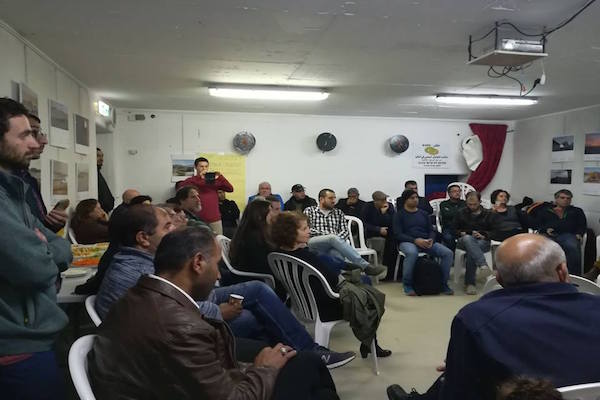The Negev Coexistence Forum for Civil Quality has been a fixture in the city of Be’er Sheva for decades. Now, following pressure from far-right activists, the city is evicting it.
By Yehudit Keshet

The city of Be’er Sheva is trying to evict the Negev Coexistence Forum for Civil Equality, the only place where Jews and Arabs can meet to work together and promote equality and understanding, following a concerted effort by far-right extremists.
The Forum has been operating out of a Jewish-Arab community center, located in a renovated bomb shelter, since 1996 — all under one condition: that it not be used for “political activities.” Over the years, the Forum, an NGO that promotes tolerance and joint living, has scrupulously adhered to this stipulation, imposed on tenants of all property owned by the city.
During each of Israel’s wars with Gaza, the shelter turned-community center, known as Multaka-Mifgash, has been kept open to the public at all hours of the day. It is probably the best kept shelter in town, and more importantly, it is the only place in Be’er Sheva where Jews and Arabs can meet socially, hosting a wide range of community and cultural events — including courses in Arabic, film festivals, literary evenings, and lectures.
But it turns out that there are those who feel that coexistence and solidarity between Jews and Arabs is subversive, even treacherous. In 2016, the Forum planned a screening of a film entitled “Trembling in Gaza,” a documentary about a trauma training workshop for professional psychologists in Gaza. It is a film that neither takes an overt political stance, nor a position on Israel’s policies; it is merely a depiction of a therapeutic process.
Shortly before the screening, the Forum received a demand from the municipality, backed by the threat of sanctions, that the screening be cancelled following alleged complaints by “the neighbors” and the alleged violation of the conditions of the Forum’s contract. In short, the municipality considered the screening “political.” The neighbors, or neighbor, as it turned out, actually lives in the occupied West Bank, and spends much of his time trying to shut down activities he regards as “leftist.”
Reluctantly, the Forum cancelled the screening and sought legal advice regarding the definition of “political activity.” According to the attorney general, this is defined by law as activities that include party-affiliated content. Nonetheless the Forum continued to be threatened. Most of the threats were veiled, intended to cause unease and distress, although some came in the form of explicit promises to evict the organization from its home.
Between October 2016 and April 2017, the Forum held a number of events that caused extremists to take action, demanding the municipality cancel them: an evening with Yesh Gvul, a veteran group of conscientious objectors who refuse to serve in the occupied territories. The event went ahead as planned.
The saga continued when the Forum, together with the Association for Civil Rights in Israel and Shatil, held a workshop on photography during demonstrations, leading to accusations that it was fomenting provocation against the police.
The situation came to a head in late 2017 when the Forum hosted a lecture about the sale of Israeli arms to dictatorial regimes, such as Myanmar. In December, following hysterical accusations that the Forum was engaging in anti-Israel propaganda and besmirching the good name of the IDF, the municipality gave the Forum two weeks to leave the shelter.
What is truly deeply troubling is not the fate of the Forum, nor the baseless accusations of subversion and treachery. What is at stake is freedom of speech, the freedom to criticize state institutions, to flout conventional wisdom, and challenge the consensus. The real issue is that in Israel today any cooperation or solidarity between Jews and Arabs is seen as deeply political and subversive. This is the real reason behind the targeting and persecution of the Forum.
Surrendering to political bullying feeds a sense of power in people who, far from having the well-being of Be’er Sheva or the Negev at heart, see an opportunity for control and self-aggrandizement. The undermining of the values of an open society while sowing fear of defamation among NGOs and individuals is, in their eyes, an effective tool to this end. It is a sad thing for the city of Be’er Sheva that Mayor Ruvik Danilovitch, who won 92 percent of the vote in the last municipal elections, has neither the political wisdom nor the political guts to stand up to these subversive elements.
Yehudit Keshet is active on behalf of Jewish Arab solidarity in the Negev. She is a member of the Negev Coexistence Forum secretariat and a member of the Negev circle of the Standing Together movement.
